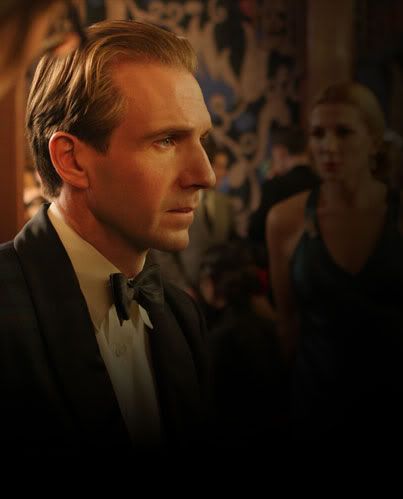Post by awlrite4now on Dec 15, 2005 5:00:12 GMT -5
Ralph Fiennes...ahhhh.
A review:
" SavannahNOW
Powerful performances, unrevealed secrets drive “The White Countess”
Set in Shanghai in the '30s, film tells story of a world about to unravel.
Bill Dawers
For the Savannah Morning News
About halfway into "The White Countess," Todd Jackson - a blind former American diplomat played with steely nerve by Ralph Fiennes - praises the former Russian noblewoman whom he wants to hire as hostess (and metaphor) for his new bar in Shanghai:
"History has no place for her kind anymore," Jackson tells a colleague. "She's perfect."
Like other Shanghai residents of the 1930s, the Countess Sofia Belinsky and some of her extended family have found their lives buffeted by the great conflicts of 20th-century history.
Presumably driven out of Russia by the Bolsheviks, the aristocratic family lives in a tenement above a Jewish family that fled the Nazis.
The resulting cultural swirl, accompanied by a dense soundtrack of voices and sounds that allows us to penetrate Jackson's sightless world, brings us Chinese jazz singers, nascent communists, moralistic Westerners, French diplomats, and a growing Japanese presence, embodied by the mysterious Mr. Matsuda (compellingly portrayed by Hiroyuki Sonada).
As the Countess, Natasha Richardson creates a character capable of stepping from one world to another. She retains her Russian elegance, even as she sells dances, and perhaps more, to Westerners in an expensive Shanghai nightclub. All the while, Sofia tries to protect her impressionable daughter.
In the process, the countess becomes both breadwinner and pariah to her family, portrayed with an eerie reserve by, among others, Richardson's mother, Vanessa Redgrave, and aunt, Lynn Redgrave.
That simple plot would be enough to carry a film, but Kazuo Ishiguro's screenplay makes the Russian family's struggle just one thread in a much larger fabric.
An elegant, demanding and darkly romantic film, and a bit long at well over 2 hours, "The White Countess" is the latest - and last - joint venture of director James Ivory and producer Ismail Merchant. Merchant died last spring. (In poignant remarks after Sunday night's screening, Richardson mentioned how the difficult shoot on location in Shanghai taxed Merchant's health.)
Sensing the coming madness, Fiennes' Jackson opens a bar and names it The White Countess. With oddly costumed performers, drunken soldiers in various uniforms, a mix of ethnicities, an infusion of political tension, and a slowly simmering sexual decadence, the establishment itself is an Asian cousin to other cinematic bars of the same era - Rick's in Casablanca, The Kit-Kat Club in Berlin.
However briefly and vainly, The White Countess is a place of refuge and wonder, while outside the world is about to unravel.
In this country, Tennessee Williams, looking across his St. Louis fire escape at the Paradise Dance Hall, captured the same mood with "All the world was waiting for bombardments."
By the time the bombardments finally come in "The White Countess," all of Shanghai is in chaos and many of the characters' secrets have been revealed.
But there's something elusive about the movie itself - the intimate nature of Jackson and Matsuda's friendship, the Countess' previous loves.
In the end, the main characters face uncertain futures, but, in the complex world of Merchant and Ivory, so do we all."
It comes out in LA/Ny on the 21st. Bet it won't come to my sorry little town.
A review:
" SavannahNOW
Powerful performances, unrevealed secrets drive “The White Countess”
Set in Shanghai in the '30s, film tells story of a world about to unravel.
Bill Dawers
For the Savannah Morning News
About halfway into "The White Countess," Todd Jackson - a blind former American diplomat played with steely nerve by Ralph Fiennes - praises the former Russian noblewoman whom he wants to hire as hostess (and metaphor) for his new bar in Shanghai:
"History has no place for her kind anymore," Jackson tells a colleague. "She's perfect."
Like other Shanghai residents of the 1930s, the Countess Sofia Belinsky and some of her extended family have found their lives buffeted by the great conflicts of 20th-century history.
Presumably driven out of Russia by the Bolsheviks, the aristocratic family lives in a tenement above a Jewish family that fled the Nazis.
The resulting cultural swirl, accompanied by a dense soundtrack of voices and sounds that allows us to penetrate Jackson's sightless world, brings us Chinese jazz singers, nascent communists, moralistic Westerners, French diplomats, and a growing Japanese presence, embodied by the mysterious Mr. Matsuda (compellingly portrayed by Hiroyuki Sonada).
As the Countess, Natasha Richardson creates a character capable of stepping from one world to another. She retains her Russian elegance, even as she sells dances, and perhaps more, to Westerners in an expensive Shanghai nightclub. All the while, Sofia tries to protect her impressionable daughter.
In the process, the countess becomes both breadwinner and pariah to her family, portrayed with an eerie reserve by, among others, Richardson's mother, Vanessa Redgrave, and aunt, Lynn Redgrave.
That simple plot would be enough to carry a film, but Kazuo Ishiguro's screenplay makes the Russian family's struggle just one thread in a much larger fabric.
An elegant, demanding and darkly romantic film, and a bit long at well over 2 hours, "The White Countess" is the latest - and last - joint venture of director James Ivory and producer Ismail Merchant. Merchant died last spring. (In poignant remarks after Sunday night's screening, Richardson mentioned how the difficult shoot on location in Shanghai taxed Merchant's health.)
Sensing the coming madness, Fiennes' Jackson opens a bar and names it The White Countess. With oddly costumed performers, drunken soldiers in various uniforms, a mix of ethnicities, an infusion of political tension, and a slowly simmering sexual decadence, the establishment itself is an Asian cousin to other cinematic bars of the same era - Rick's in Casablanca, The Kit-Kat Club in Berlin.
However briefly and vainly, The White Countess is a place of refuge and wonder, while outside the world is about to unravel.
In this country, Tennessee Williams, looking across his St. Louis fire escape at the Paradise Dance Hall, captured the same mood with "All the world was waiting for bombardments."
By the time the bombardments finally come in "The White Countess," all of Shanghai is in chaos and many of the characters' secrets have been revealed.
But there's something elusive about the movie itself - the intimate nature of Jackson and Matsuda's friendship, the Countess' previous loves.
In the end, the main characters face uncertain futures, but, in the complex world of Merchant and Ivory, so do we all."
It comes out in LA/Ny on the 21st. Bet it won't come to my sorry little town.






 Thanks very much, Alice.
Thanks very much, Alice.

